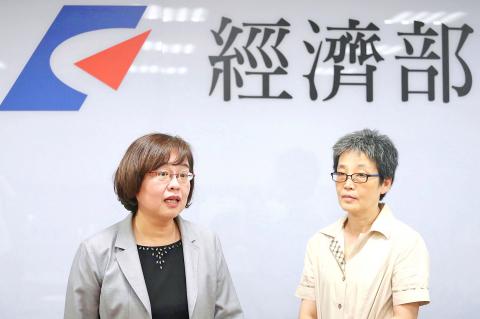The Investment Commission yesterday rejected Hong Kong-based Nan Hai Corp’s (南海控股) application to develop the Twin Towers project in Taipei, citing national security concerns over capital with Chinese origins.
The company was formed by Hong Kong-based Nan Hai Development Ltd (南海發展) and Malaysian property developer Malton Berhad. It applied to invest NT$1 billion (US$32.1 million) to set up an office in Taiwan and to build the multimillion-dollar project near Taipei Railway Station.
The commission said that it rejected the company’s development plan based on Article 7 of the Statute for Investment by Foreign Nationals (外國人投資條例), despite it having previously won most-favored applicant status in bidding conducted by the Taipei Department of Rapid Transit Systems in December last year.

Photo: CNA
“The commission has determined a strong link between the investors and the Chinese market,” commission spokeswoman Yang Shu-ling (楊淑玲) told a media briefing in Taipei.
She cited national security concerns behind the commission’s decision because of the project’s proximity to major transportation junctions such as the mass rapid transit system, the railway, the high-speed railway and the bus station.
“The investor’s parent company, Bermuda Nan Hai Corp, revealed in its financial statement in 2018 that most of the company’s sales and employees are situated in China,” Yang said, adding that the company should be recognized as listed in China.
The commission said that Nan Hai’s executive officer is Chinese, while more than half of the company’s board members who are responsible for business operations and execution are also Chinese.
Two out of five members of the company’s nomination committee, which advises the board of directors, are likewise Chinese, the commission said.
Furthermore, the company’s real-estate branch, Nan Hai Development Ltd, has pledged its stock to China Digital Licensing Group Ltd (中國數碼), which four Chinese directors on a board of seven.
Chinese make up more than half of the members of the nomination committee established by the board of directors, the commission said.
Having previously lost its bid for the project, Hongwell Group (宏匯集團), the property development arm of computer maker Clevo Co (藍天電腦), yesterday said that it would make an all-out effort to seize the opportunity if it were asked to take over the project, the Central News Agency reported.
Hongwell said it is awaiting a decision by the Taipei Department of Rapid Transit Systems.
Taipei City Government deputy spokesman Ko Yu-an (柯昱安) said that the city government has been informed of the result of the commission’s review of the project, adding that it would issue a response today after studying the information.
Additional reporting by Lee I-chia

The Taiwanese passport ranked 33rd in a global listing of passports by convenience this month, rising three places from last month’s ranking, but matching its position in January last year. The Henley Passport Index, an international ranking of passports by the number of designations its holder can travel to without a visa, showed that the Taiwan passport enables holders to travel to 139 countries and territories without a visa. Singapore’s passport was ranked the most powerful with visa-free access to 192 destinations out of 227, according to the index published on Tuesday by UK-based migration investment consultancy firm Henley and Partners. Japan’s and

NATIONAL SECURITY THREAT: An official said that Guan Guan’s comments had gone beyond the threshold of free speech, as she advocated for the destruction of the ROC China-born media influencer Guan Guan’s (關關) residency permit has been revoked for repeatedly posting pro-China content that threatens national security, the National Immigration Agency said yesterday. Guan Guan has said many controversial things in her videos posted to Douyin (抖音), including “the red flag will soon be painted all over Taiwan” and “Taiwan is an inseparable part of China,” while expressing hope for expedited “reunification.” The agency received multiple reports alleging that Guan Guan had advocated for armed reunification last year. After investigating, the agency last month issued a notice requiring her to appear and account for her actions. Guan Guan appeared as required,

Japan and the Philippines yesterday signed a defense pact that would allow the tax-free provision of ammunition, fuel, food and other necessities when their forces stage joint training to boost deterrence against China’s growing aggression in the region and to bolster their preparation for natural disasters. Japan has faced increasing political, trade and security tensions with China, which was angered by Japanese Prime Minister Sanae Takaichi’s remark that a Chinese attack on Taiwan would be a survival-threatening situation for Japan, triggering a military response. Japan and the Philippines have also had separate territorial conflicts with Beijing in the East and South China

A strong cold air mass is expected to arrive tonight, bringing a change in weather and a drop in temperature, the Central Weather Administration (CWA) said. The coldest time would be early on Thursday morning, with temperatures in some areas dipping as low as 8°C, it said. Daytime highs yesterday were 22°C to 24°C in northern and eastern Taiwan, and about 25°C to 28°C in the central and southern regions, it said. However, nighttime lows would dip to about 15°C to 16°C in central and northern Taiwan as well as the northeast, and 17°C to 19°C elsewhere, it said. Tropical Storm Nokaen, currently